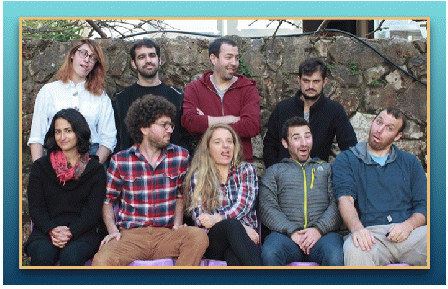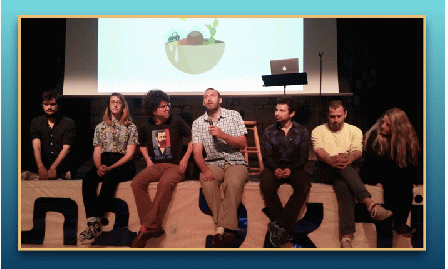| Back OpEd News | |||||||
|
Original Content at https://www.opednews.com/articles/The-Israeli-Version-of-Th-by-Joan-Brunwasser-Hebrew_Interviews_Israel_Israelis-171003-920.html (Note: You can view every article as one long page if you sign up as an Advocate Member, or higher). |
|||||||
October 2, 2017
Israeli Version of "This American Life" Is Ready for Prime Time
By Joan Brunwasser
Steven Spielberg made a risky bet on a group of young people in Israel who were starting out on a project recording stories, "This American Life"-style: intimate and refreshing, poignant and fascinating. It went viral. Here's their exciting story."Together, we decided to go for it. The only problem was that none of us knew the first thing about radio or journalism. It took us nearly a year to create the first Hebrew episode."
::::::::
My guest today is Mishy Harman, co-founder and host of the radio show/podcast, Israel Story.
Joan Brunwasser: Welcome to OpEdNews, Mishy. I'm quite sure that most of our readers have never heard of either you or your show. Let's take care of that right away. Get us started, please.
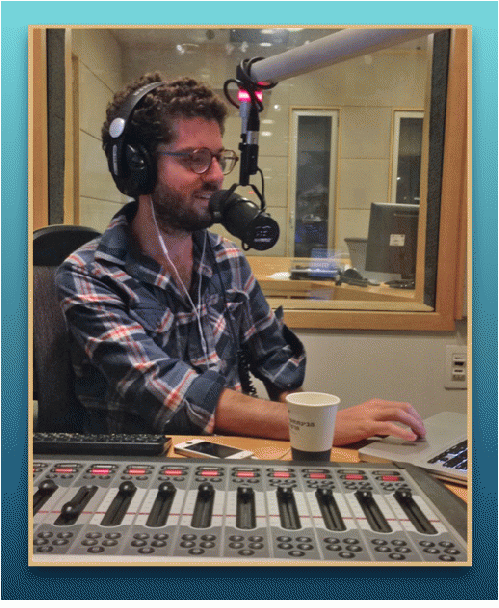
Mishy Harman records 'Israel Story' episode, Galey Tzahal studios, Jaffa, Israel, 2015
(Image by Israel Story) Details DMCA
Mishy Harman: Sure, and nice to be here. Thanks for having me. Well, my name is Mishy Harman, and I'm a curly-haired 33-year-old from from Jerusalem, Israel. I'm the host of Israel Story which is Israel's leading podcast (and national radio show), in both Hebrew and English. It is often referred to as the 'Israeli This American Life.' Essentially, what we try to do is tell human-interest stories, and move the discussion beyond the usual narratives about Israel being either a place of conflict, settlements and terror or else a "start-up nation" that invented the cherry tomato. (Both those characterizations are - we feel - pretty flat, and fail to capture the richness and diversity that exists here.) But honestly, the best way to learn more about the show is just to download one of our episodes, and take a listen.
As for me, I grew up in Jerusalem, and am a very committed Jerusalemite. Following my military service in the IDF, I went abroad, studied history at Harvard, and then got a masters in archeology at Cambridge. Recently I finished my PhD, also in history, at the Hebrew University. My dissertation was a story of sorts - a biography of a nineteenth-century man called Samuel Gobat, who was the first Protestant missionary to reach Ethiopia and later the Anglican bishop of Jerusalem. Kind of random, I know....
Other than that, I have a beautiful Vizsla dog named Nomi who recently gave birth to five adorable puppies (one of whom, Golda, I am keeping). I spend an inordinate amount amount of time with my family, whom I love more than anything in the world.
JB: Share with our readers how Israel Story came to be. That's a story in and of itself!
MH: Of course. It has sort of become part of the mythology of our show by now.
So, in 2011, after many years of living and studying abroad, I decided to come back to Israel to begin my PhD. And as some sort of temporary farewell to the States, I bought a blue 2000 Ford Focus station wagon and embarked on a 13,000-mile-long road trip, through 32 states, with Nomi, the dog. As I was about to hit the road, my best friend Roee - who accurately figured that I'd be spending a whole lot of time in the car - downloaded hundreds of episodes of This American Life to my phone. I had never really heard of podcasts before, and had definitely never actually listened to one. So for a while, I ignored Roee's advice that "this will open up a whole new world for you" and instead just took in the scenery, listened to pop music and top-forty stations, and was flabbergasted by certain Christian talk radio shows ("So, Merv, would you call Obama the devil, the anti-Christ or just a plain old Muslim?"). And then, as some point, outside of Vicksburg, Mississippi, I heard my first This American Life episode. It left me so speechless that I had to pull over. It was a combination of intimate and refreshing, poignant, voyeuristic and fascinating.
From that moment on, I listened exclusively to the show, catching up on hundreds and hundreds of episodes. I laughed and cried and was able - for the first time - to understand what life looks like from very different vantage points: I heard about the lives of migrant agricultural workers, about the struggles of farmers in Iowa, about deals made by fancy Wall Street brokers, and about daily realities of inner-city African American teens. It was all a real eye opener, and paled in comparison to Israeli radio which consisted, for the most part, of aggressive interviewers yelling at the same handful of tired politicians. So it didn't take me long to figure out that this was going to be my next big project - an Israeli This American Life.
JB: How'd that go?
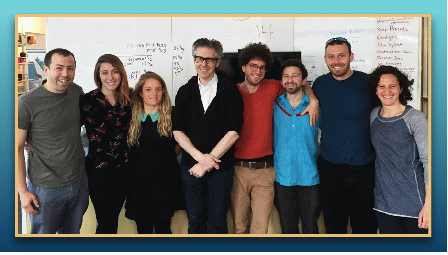
'Israel Story' team with 'This American Life' host Ira Glass, NYC studio, 2015
(Image by Israel Story) Details DMCA
MH: I came back to Jerusalem, and got three of my closest childhood friends, Roee Gilron, Shai Satran and Yochai Maital, interested in the project. Together, we decided to go for it. The only problem (which quickly turned out to be no small obstacle) was that none of us knew the first thing about radio or journalism. It took us nearly a year to create the first Hebrew episode, since we had to teach ourselves all the basics: Everything from how to record and edit to how to write for our target audience. We got some great help from Nancy Updike, one of the senior producers of This American Life who was living in Israel at the time. She even introduced us to her boss, Ira Glass, and we learned a lot from observing their process in NYC.
The show began as a podcast meant mainly for family and friends. I remember that early on, we said that if it ever got picked up by some local radio station and aired at 3am, it would be really cool, since all kinds of random truck drivers would hear our stories. But then, the show started gaining an audience, and going viral. And soon thereafter, I bumped into the head of Galey Tzahal (Army Radio), which is Israel's largest and most popular national radio station. I told him about our small project, and he was intrigued. A few months later, as if in a dream, we were offered a prime-time slot on national radio.
JB: That's really an amazing story! How lucky it was that none of you dwelt on just how much you didn't know and you all jumped in anyway. When your podcast got picked up by Israel's premier radio station, did everyone leave their day jobs and devote all their energies to this show?
MH: Oh, no! Not at all. It remained a late-night hobby for all us for quite some time. We always joked and said that our show was what we did between 10pm and 3am. It wasn't until we had completed an entire first season of eleven episodes in Hebrew that we started to think of this as anything more than just a cool side project. That shift coincided with another realization, which I mentioned before, about how Israel was repeatedly represented abroad in this flat, or unidimensional, manner. So we decided to embark on a new project - an English show (or, as my college roommate Brandon called it, "An American version of the Israeli version of 'This American Life'"). That's when Steven Spielberg and his Righteous Persons Foundation made a risky bet on us, and gave us an unbelievably generous grant which enabled us to make it a real job.
The Hebrew show is called Sipur Israeli and its English counterpart is called Israel Story.
JB: Now that Israel Story has evolved into a more 'serious' enterprise, has it changed the dynamic between the four founders? Are you all still involved? Has your team grown since the beginning?
MH: Yes, of course it has. First of all, our team has grown a lot, and some of the original founders have moved on to other endeavors. We are all still very close, but Roee, for instance, has begun a postdoc in San Francisco, and is thus naturally less involved on a day-to-day basis. All of the founders (expect for me) have had kids in the last couple of years, so that also changes the group dynamic to an extent. Maya Kosover was our first external hire, and she is a wonderfully talented radio producer who brings new perspectives and a new voice to the show. In addition, we have junior producers, interns, a production manager, sound designers, scorers, etc. The size of our team ebbs and flows, but it is always somewhere between eight and thirteen. We are very lucky to be working with amazingly dedicated people.
JB: It is indeed a talented crew. I first came across Israel Story when your troupe performed in Evanston late last year. I immediately became a fan of your podcasts. At what point did you decide to take the show on the road? And what were you hoping to accomplish?
MH: The idea of lives shows actually came from our dear friends at the JCC Manhattan. Back in 2015, they approached us with what seemed like an incredible offer - to produce a staged version of an Israel Story episode and put it on in New York. We knew that big shows like This American Life and Radiolab had put on live shows, and we thought that this could be an interesting challenge. Our first show, which headlined the JCC's Israeli Independence Day celebration was called 'Herzl 48,' and the idea was to tell stories of 'regular' Israelis, who all happened to share one seemingly random attribute - they all lived or worked at 48 Herzl St. in towns and cities all the way from Kiryat Shmona in the north to Dimona in the south.
Little did we know, when we accepted the offer, how different live show production is from creating a podcast. We had to think of entirely new realms, such as visuals, staging, movement, etc. But to our delight, the show was a hit, and inaugurated what has since become a core facet of our operation. In the last two and a half years, we've produced eight different shows (six in English, and two in Hebrew), and have had multiple tours across America with each of them. Our shows have taken us to more than thirty cities, and have allowed us to collaborate with phenomenal artists - singers, musicians, dancers, video artists, animators, comedians, actors and more.
What we love about these shows is that it allows us to meet our audience, and to see their reactions, in real time. Usually, we release an episode and it sort of goes into the air, we see the numbers, and study the analytics, but we don't really know if a certain line worked, or if a joke got laughs, or if an emotional moment came through. With the live shows, everything happens in front of our eyes, which is both scary and exhilarating.
JB: I bet. You've covered a lot of territory in the last few years! What's up next for you and Israel Story?
MH: Good question. One of the most exciting aspects of what we do is that it's basically impossible to run out of stories. Of course we always strive to grow, in every possible way - to challenge ourselves, report more complicated stories, improve our skills as storytellers, as editors, as scorers, etc. We very much hope to grow our audience, as we are still far from reaching our potential, and we hope - one day - to stand on sturdier financial grounds. But the bottom line is that we love what we do, and feel privileged to be able to tell people's stories, and add our tiny, tiny mark in the process.
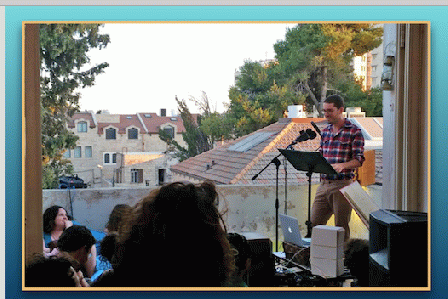
Mishy tells a story as part of Israel Story's live show at his home in Jerusalem, 2017
(Image by Israel Story) Details DMCA
JB: Stories are the best! Anything you'd like to add before we wrap this up?
MH: Well, I guess I hope that people reading this will take a moment to check out our show, and maybe even listen to an episode as they're taking the dog out, or going for a run, or doing the dishes. And I hope that what they hear will make them want to hear more, and - above all - will make them realize that a person is a person is a person, no matter who they are and what they believe in, or what they look like, or who they want to marry. At the end of the day, we are all just people, and each one of us has his or her story to tell.
JB: So true. Thanks so much for talking with me, Mishy. It's been a pleasure. I've really enjoyed Israel Story, via podcast as well as the live performance I was lucky enough to catch last fall. You folks are definitely on to something!
***
Image editing and layout by OpEdNews managing editor, Meryl Ann Butler. Thanks, Meryl Ann!
***
Israel Story website
Facebook: https://www.facebook.com/sipurisraeli/
Twitter: https://twitter.com/israelstory
Instagram: https://www.instagram.com/israel.story/
New York Times article
Recent Jerusalem Post article
Authors Website: http://www.opednews.com/author/author79.html
Authors Bio:
Joan Brunwasser is a co-founder of Citizens for Election Reform (CER) which since 2005 existed for the sole purpose of raising the public awareness of the critical need for election reform. Our goal: to restore fair, accurate, transparent, secure elections where votes are cast in private and counted in public. Because the problems with electronic (computerized) voting systems include a lack of transparency and the ability to accurately check and authenticate the vote cast, these systems can alter election results and therefore are simply antithetical to democratic principles and functioning.
Since the pivotal 2004 Presidential election, Joan has come to see the connection between a broken election system, a dysfunctional, corporate media and a total lack of campaign finance reform. This has led her to enlarge the parameters of her writing to include interviews with whistle-blowers and articulate others who give a view quite different from that presented by the mainstream media. She also turns the spotlight on activists and ordinary folks who are striving to make a difference, to clean up and improve their corner of the world. By focusing on these intrepid individuals, she gives hope and inspiration to those who might otherwise be turned off and alienated. She also interviews people in the arts in all their variations - authors, journalists, filmmakers, actors, playwrights, and artists. Why? The bottom line: without art and inspiration, we lose one of the best parts of ourselves. And we're all in this together. If Joan can keep even one of her fellow citizens going another day, she considers her job well done.
When Joan hit one million page views, OEN Managing Editor, Meryl Ann Butler interviewed her, turning interviewer briefly into interviewee. Read the interview here.
While the news is often quite depressing, Joan nevertheless strives to maintain her mantra: "Grab life now in an exuberant embrace!"
Joan has been Election Integrity Editor for OpEdNews since December, 2005. Her articles also appear at Huffington Post, RepublicMedia.TV and Scoop.co.nz.
